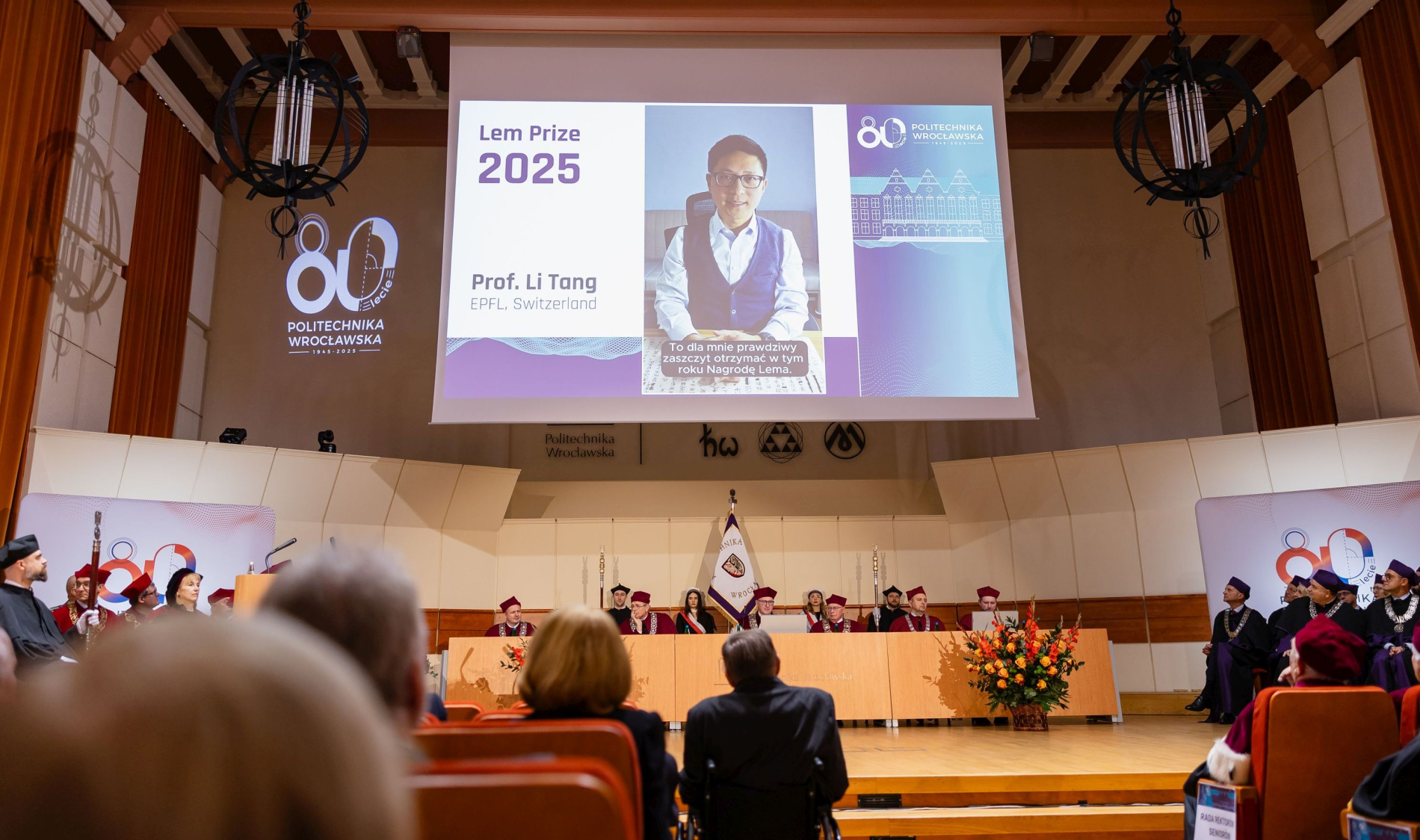

Wrocław, Poland — Leman Biotech proudly announces that its co-founder and Chairman, Professor Li Tang, has been awarded the 2025 Stanisław Lem European Research Prize (Lem Prize) by Wrocław University of Science and Technology. The award was announced on November 14, 2025, during the university’s 80th-anniversary celebrations. This prestigious distinction recognizes Prof. Tang's groundbreaking contributions to immunoengineering, which is poised to redefine the future of cancer immunotherapy.


The Lem Prize is one of Europe’s highest honors for early-career researchers whose work bridges scientific excellence, technological innovation, and philosophical foresight. It is awarded annually to one outstanding researcher under the age of 40 studying or working in Europe or associated countries — regardless of nationality or country of origin. The prize celebrates recent discoveries or significant achievements in the broad fields of science and engineering, with strong emphasis on technology, interdisciplinarity, creativity, and imagination—values embodied by Stanisław Lem (1921–2006), the legendary Polish science-fiction writer. This is the fifth edition of the prize, established in 2021 to commemorate the centenary of Lem’s birth.
Prof. Tang was selected by an international committee chaired by Prof. Maciej Lewenstein (ICFO, Barcelona) for his project, “A Paradigm Shift in Cancer Immunotherapy: Harnessing Type 2 Immunity for Curative and Accessible Therapies.”
A Paradigm Shift in Immunotherapy
For decades, cancer immunotherapy has relied almost exclusively on type 1 immunity — notably cytotoxic T cells and IFN-γ-driven responses. Although transformative, this approach often fails in solid tumors and relapsed or refractory disease.
Prof. Tang’s team made the revolutionary discovery that type 2 immunity, long considered anti-inflammatory or even tumor-promoting, can be rationally engineered to drive potent, durable anti-tumor responses. By strategically modulating cytokines such as IL-10 and IL-4, his laboratory has pioneered a fundamentally new therapeutic axis —redefining type 2 immunity as a programmable driver of tumor control..
This foundational science, developed at EPFL, is now being translated into clinical innovation at Leman Biotech. The company’s lead candidate, Meta10-19 CAR-T, a metabolically armored CD19 CAR-T therapy, has demonstrated breakthrough efficacy in investigator-initiated trials (IITs): achieving 100% complete remission in patients with relapsed/refractory B-cell malignancies at cell doses as low as 1/1,000th of conventional CAR-T doses — marking a major step toward safer, more effective, more scalable, and globally accessible cell therapies.
“As a scientist working in the fields of immunoengineering and cancer immunotherapy, I’m inspired by the idea that science and imagination together can expand the boundaries of what is possible in human health,” said Prof. Li Tang. “This echoes the spirit of Stanisław Lem. I dedicate this award to my team, my collaborators—especially clinicians and patients—and to all who believe that science guided by imagination can shape a better world.”
Prof. Tang will formally receive the award in 2026 during a special ceremony at Wrocław University of Science and Technology, where he will be presented with a statuette created by renowned artist Prof. Przemysław Tyszkiewicz.
About Prof. Li Tang
Prof. Li Tang holds a B.S. in Chemistry from Peking University (2007) and a Ph.D. in Materials Science & Engineering from the University of Illinois at Urbana-Champaign (2012). He was a CRI Irvington Postdoctoral Fellow at MIT (2013–2016) and joined EPFL as a Tenure-Track Assistant Professor in 2016, promoted to Associate Professor with tenure in 2022. He currently serves as Vice Dean for Innovation and Director of the Innovate4Life program at EPFL’s School of Life Sciences.
His work has received numerous awards, including the Friedrich Miescher Award (2025), Leenaards Prize for Translational Research (2025), Biomaterials Science Lectureship (2025), CAB Mid-Career Investigator Award (2024), Biomaterials Award for Young Investigators (2024), European Research Council (ERC) Starting Grant (2018), and recognition in MIT Technology Review’s "Top 35 Innovators under 35" list for the China region (2019).
About the Stanisław Lem European Research Prize
Lem Prize was established by Wrocław University of Science and Technology to commemorate the 100th birthday of Stanisław Lem, the eminent Polish visionary and science fiction writer whose books have been translated into over 50 languages and have sold over 45 million copies. He is best known worldwide as the author of the novel Solaris (1961).
The Lem Prize honors one young researcher whose creative work in science or engineering has the potential to positively shape the future of a world increasingly defined by technology. The Prize Committee consists of distinguished international scientists as well as professores magni and members of Academia Iuvenum of Wrocław University of Science and Technology, along with Tomasz Lem, the writer’s son.
About Leman Biotech
Leman Biotech is a clinical-stage biotechnology company dedicated to revolutionizing cancer immunotherapy through metabolic reprogramming. Its proprietary Meta10 platform reprograms T-cell metabolism to overcome key limitations of current immunotherapies — including T-cell exhaustion, poor persistence, and low response rates — with the goal of unlocking unprecedented anti-tumor efficacy and durability.
The company’s lead candidate, Meta10-19 CAR-T, has demonstrated remarkable efficacy and safety in early clinical studies at ultra-low cell doses. Clinical results in patients with relapsed or refractory B-cell acute lymphoblastic leukemia (B-ALL) were published in The Lancet Haematology in October 2025, reporting a 100% complete remission rate with an improved safety profile.
Beyond oncology, Leman Biotech is advancing robust pipelines of next-generation immunotherapies for autoimmune diseases and solid tumors. Complementing its therapeutic innovation, the company is developing an automated, fully enclosed CMC (Chemistry, Manufacturing, and Controls) process to enable scalable, cost-effective, and globally accessible CAR-T manufacturing.